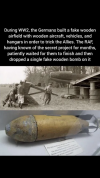Myytti puhtoisesta Chuchillista - totuus rauhankyyhky Hitleristä. Miten tällaista voidaan päästää jo Wikipediaankin? Seuraavaksi ne kertoo että Churchill sai sakemannit aloittamaan Blitzin hyökkäämällä toistuvasti saksalaisia siviilikohteita vastaan. Loppui se peace mongering!
https://en.wikipedia.org/wiki/Battle_of_Britain#Negotiated_peace_or_neutrality
Hitler's 1923
Mein Kampf mostly set out his hatreds: he only admired ordinary German World War I soldiers and Britain, which he saw as an ally against communism. In 1935 Hermann Göring welcomed news that Britain as a potential ally was rearming. In 1936 he promised assistance to defend the British Empire, asking only a free hand in Eastern Europe, and repeated this to
Lord Halifax in 1937. That year,
von Ribbentrop met Churchill with a similar proposal; when rebuffed, he told Churchill that interference with German domination would mean war. To Hitler's great annoyance, all his diplomacy failed to stop Britain from declaring war when he invaded Poland. During the fall of France, he repeatedly discussed peace efforts with his generals.
[43]
When Churchill came to power, there was still wide support for Halifax, who as Foreign Secretary openly argued for peace negotiations in the tradition of British diplomacy, to secure British independence without war. On 20 May, Halifax secretly requested a Swedish businessman to make contact with Göring to open negotiations. Shortly afterwards, in the
May 1940 War Cabinet Crisis, Halifax argued for negotiations involving the Italians, but this was rejected by Churchill with majority support. An approach made through the Swedish ambassador on 22 June was reported to Hitler, making peace negotiations seem feasible. Throughout July, as the battle started, the Germans made wider attempts to find a diplomatic solution.
[60] On 2 July, the day the armed forces were asked to start preliminary planning for an invasion, Hitler got von Ribbentrop to draft a speech offering peace negotiations. On 19 July Hitler made this speech to the German Parliament in Berlin, appealing "to reason and common sense", and said he could "see no reason why this war should go on".
[61] His sombre conclusion was received in silence, but he did not suggest negotiations and this was effectively an ultimatum which was rejected by the British government.
[62][63] Halifax kept trying to arrange peace until he was sent to Washington in December as ambassador,
[64] and in January 1941 Hitler expressed continued interest in negotiating peace with Britain.
[65]
----
Onneksi Churchill piti päänsä kylmänä kunnes tuo peace craze blew over.





